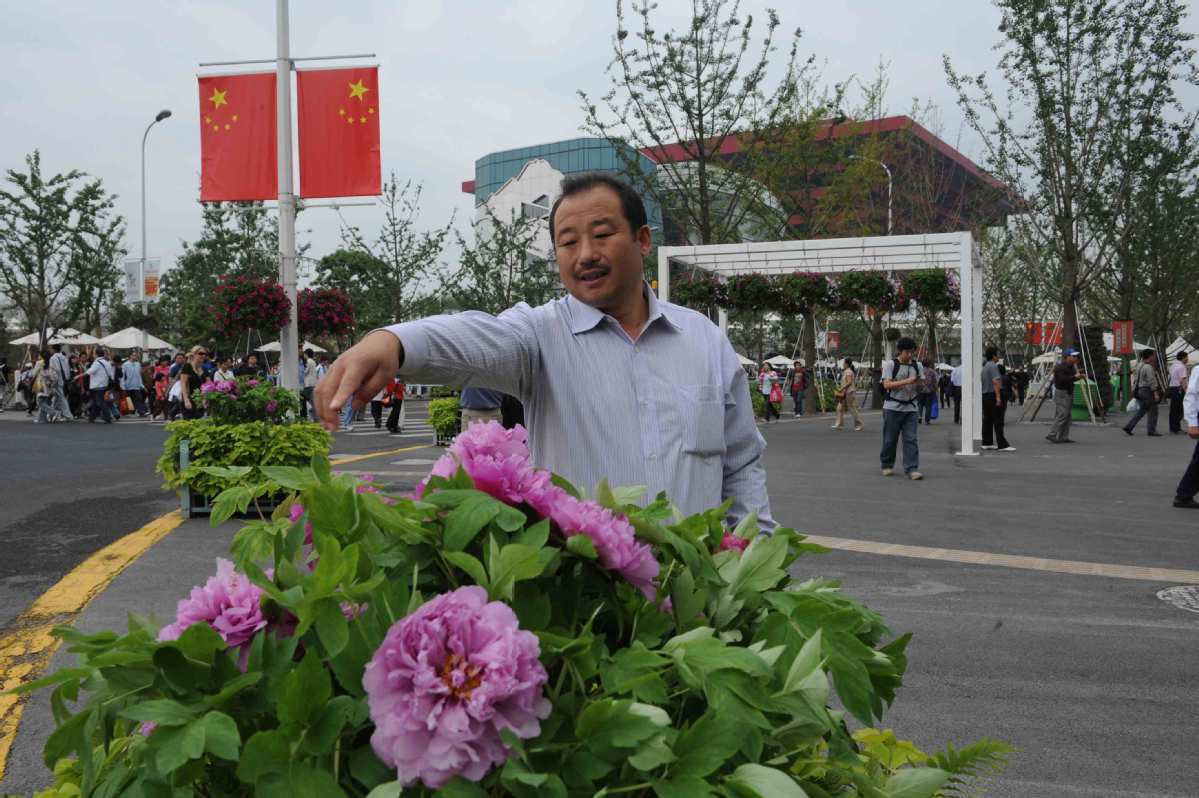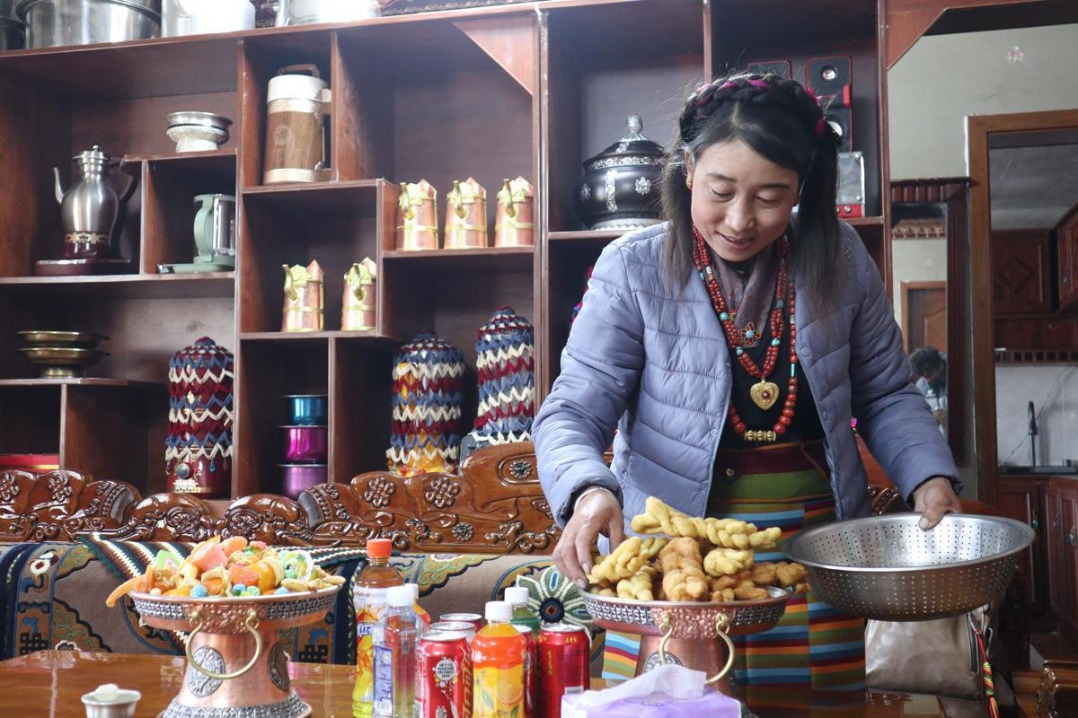Master of flowers shares his passion while making a profit


In November, Fu Zhenglin retrieved two boxes of flower cuttings that had been shipped from the Netherlands and took them to Luoyang, Henan province.
They contained a new species of peony, which he aimed to plant and study in his garden.
As chairman of Luoyang Shenzhou Peony Co, a major flower growing enterprise, Fu has dealt with peonies for more than three decades. He is so familiar with the flowers that he can identify some species by smell.
Fu has built peony plantations in Seattle, Washington, in the United States; in Sao Paulo, Brazil; and in the Netherlands. His fresh-cut peonies have been sold in the US, Australia, the European Union and Southeast Asia.
"Australia is strict on imported fresh flowers, but we have managed to export thousands of peonies there since 2016," Fu said. "In the busy season, we can cut about 30,000 to 50,000 fresh peonies every day."
Born in Luoyang's Licun town, which is known for its nursery stock, Fu has long been familiar with flowers and other plants. He started working for the Luoyang Forestry Institute in 1985 as a researcher.
Tourists' enthusiasm during the Peony Fair inspired him to grow peonies. He started on 0.7 hectares and timed the plants' growth so that the flowers would blossom during Spring Festival and he could sell them in Guangzhou, Guangdong province.
"A Hong Kong client bought all my peonies one year for 15 yuan ($2.20) each, so I earned 40,000 yuan, which was a huge amount of money in the late 1980s," Fu recalled.
In the 1990s, as more farmers started growing peonies in Luoyang, profits declined. When Fu saw the rising number of tourists coming to the Peony Fair, he decided to open a peony ornamental park.
In 1999, he took over a scenic spot and turned it into a peony park with 50,000 flowers. It was the first private peony park in Luoyang.
Unfortunately, when the park officially opened in April 2003, the SARS epidemic forced it to close on its second day.
"I couldn't afford my staff's salary at that time, but they trusted me and stayed with me," Fu said.
In 2005, Fu visited a peony park in Shimane, Japan, where he was shocked by how developed the peony industry was.
"At that time, Japan had more species and brighter colors, and their planting and cultivation techniques were incredible," Fu said. "They could provide peonies in any season, and even daily."
"I couldn't sleep when I was in Japan, as they had done such a good job growing peonies," he added.
After returning to his own park, Fu decided to pull it down and build a new one to present traditional Chinese culture, even though he had to borrow 5 million yuan.
"Peonies in China have a history of more than 1,600 years, and many poets have left poems about peonies. We have to tell all those stories in my new peony park," Fu said.
His Shenzhou Peony Park imitates the building styles of the Tang Dynasty (618-907), and features areas for enjoying the flowers, as well as a planting base.
In the park, tourists can see more than 1,000 species from all over the world.
When the Peony Fair started in 1983, it ran for just 10 days. It 2002, it ran for 15 days.
"We used to wait for the peonies to blossom. When they started, we opened the peony fair," Fu said. "Now we can decide when they will blossom. Last year's peony festival lasted for 40 days."
Shi Guoan, a peony professor at Henan University of Science and Technology, said peonies need three years to blossom and must pass through a low temperature phase.
"Now we lower the temperature through artificial methods, and then create the temperature that is appropriate for the blossoming," Shi said.
Fu's peony business has provided hundreds of jobs to nearby residents.
Tang Guizhen, 65, has worked at the Shenzhou Peony Park for a dozen years.
"Taking care of the peonies makes me fall in love with the flowers, and I can make a living for my family instead of being a housewife," Tang said.
To celebrate the 60th anniversary of the foundation of the People's Republic of China, in 2009, 4 million pots of flowers were placed across Beijing to decorate the city, with 15,000 of them from Fu's greenhouse.
Fu engineered his flowers to blossom during the National Day holiday.
"We provide peonies for most major events in China, such as the 2008 Beijing Olympic Games, the G20 Hangzhou Summit in 2016 and the China International Import Expo in November," said Fu.
Now, 80 percent of his orders come from e-commerce, and he sees great potential in the fresh-cut peony market.
"Last year, we held a promotion to sell peonies on Taobao, but we had to shut it down three hours after the promotion started because we had already received orders for 500,000 peonies, which is almost beyond our planting capability," Fu said.
"Now I can have fresh-cut peonies in China from March to July, because I have bases from the west to the east, and my goal is to build peony plantations around the world to provide fresh cut peonies globally," he said.
- Nation's space program records stellar year of firsts
- Xi greets Thongloun on his reelection as Lao party chief
- Top Party leadership hears series of annual work reports
- 'Great ship' of shared future sails onward
- Ten photos from across China: Jan 2 - 8
- Jilin winter fishing festival fetches record auction, visitors




































